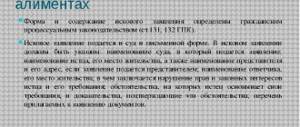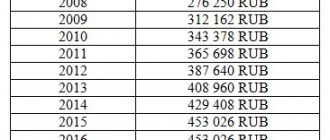Parents are required to support their children. Divorce does not become a reason for neglecting this rule. If a person is required to pay child support, the new 2021 law will regulate the process for carrying out the action. The adoption of an updated regulatory act has been discussed for several years. From time to time, various bills are submitted for public discussion, suggesting the introduction of certain amendments.
Thus, it was planned to introduce a minimum fixed amount of payments. Moreover, its size did not depend on the payer’s salary. Information about establishing the minimum amount of alimony has caused mixed reactions. As a result, the amendment was never adopted. Meanwhile, new proposals continue to be put forward. We will talk further about the proposed changes or amendments made to the Family Legislation, as well as about the liability to which the defaulter may be held.
Minimum amount of child support in 2021
So far, there is no clear rule in family law regulating the minimum amount of alimony. In November 2021, deputies of A Just Russia introduced a bill to the State Duma that stipulates the minimum possible amount of payments for children. According to the authors of the amendments, it should not be less than the subsistence minimum per child in the region of residence.
On average in the regions, the subsistence level (LS) per child is about 10,000 rubles , but in some regions of the Federation it may be higher (for example, in the Yamalo-Nenets Autonomous Okrug, the minimum subsistence level for children in the 2nd quarter of 2019 was 16,700 rubles).
The State Duma rejected the draft law in the first reading in February 2021.
So far, the minimum amount of child support is not limited , so you can only roughly calculate the possible minimum amount as a share of income and in a fixed sum of money (TDS). Alimony as a percentage of income is assigned when the payer has a stable official income. Official income cannot be lower than the minimum wage (minimum wage), which in 2021 is 12,130 rubles . Alimony is assigned from earnings after withholding income tax (13%), therefore, the minimum amount of alimony in shares will be equal to:
| Number of children for whom child support is paid | Amount of alimony payments |
| For one child | (12130 – 13%) / 4= 2638.28 rub. |
| For two children | (12130 – 13%) / 3 = 3517.70 rub. |
| For three or more children | (12130 – 13%) / 2 = 5276.55 rub. |
If alimony is prescribed in the TDS, then its amount depends on the cost of living for a certain socio-demographic group in the region of residence of the recipient of the funds.
Example . The cost of living per child in Orel in 2019 was 10,030 rubles. Since both parents must equally care for their minor children, this amount must be divided in half: 10,030 rubles. / 2 = 5015 rub. If this indicator increases, the assigned payment amount will be indexed.
It should be borne in mind that each party to alimony legal relations has the right to change the amount of alimony paid in court: reduce or increase it. However, this requires compelling reasons.
Indexation of alimony in a fixed amount of money
According to Part 1 of Art. 117 of the Family Code (FC) of the Russian Federation, alimony paid in a fixed amount of money is subject to indexation. It must be carried out either by the payer’s employer or by the bailiff who is in charge of the proceedings for the collection of alimony.
Alimony paid under a notarial agreement is indexed in accordance with the conditions specified in the agreement. If there is no clause on indexation in the agreement, then it is carried out according to the general principles of family law.
According to the law, alimony is indexed in proportion to the increase in the cost of living . If the monthly minimum is reduced, then indexation is not carried out - that is, alimony cannot become less than it was. This is confirmed by clause 5.2 of the “Methodological recommendations on the procedure for fulfilling the requirements of executive documents on the collection of alimony.”
No innovations are expected in this area of alimony legislation: indexation of alimony in the TDS will be carried out as before in order to compensate for the level of inflation.
Statement of claim for alimony
The above-mentioned law also affected the requirements for a statement of claim for the recovery of alimony.
- Now it is not necessary to attach copies of all documents for the defendant to the court claim. But you still have to cook them. According to the new rules, a copy of the claim with attachments must be sent independently to all persons involved in the case by registered mail with notification and a list of the attachments. Attach the shipping documents to the statement of claim to the court.
- In the claim, in addition to the surname, name, patronymic and address of the defendant, you must indicate: date, place of birth, place of work, as well as any of the following identifiers: SNILS, INN, OGRNIP, series and number of passport, driver's license, vehicle registration certificate. Information is provided provided that it is known to the plaintiff.
The same rules apply to applications for a court order.
"Housing" alimony
In 2021, a specific clause appeared in the Family Code, which obliges the alimony payer to pay additional alimony, which would go towards providing the child with housing.
The corresponding bill was developed by the Ministry of Justice back in 2021. It was assumed that housing support would be collected only if the child and the parent who lives with him really need this type of material support.
additional funds could be recovered from the alimony payer . Most often, such situations included illness or serious injury of a child, but this list is not closed. It was this article that the Ministry of Justice decided to supplement with a clause on the collection of “housing” alimony.
On October 9, 2021, the Government of the Russian Federation introduced a bill on “housing” alimony to the State Duma. It was approved in the first reading on December 5, 2021, on January 21, 2021 - in the second, and on January 23, 2020, the draft law was adopted in the third, final reading.
In the article “Housing alimony” you can find out all the details of the law.
Will the state pay child support?
Back in April 2021, a bill was introduced to the State Duma on the payment of child support by the state in cases where it is impossible to collect funds from their parents. This initiative was not considered in 2021, but it is quite possible that legislators will return to it in 2021.
According to the innovation, the state would pay alimony if the following conditions are met:
- The parent has not paid child support for more than 6 months.
- It is impossible to foreclose on the property of a defaulter.
In addition, in November 2021, bill No. 828623-7 was also introduced into the State Duma, according to which funds for children whose parents are evading payment of child support and are wanted will be paid from the budgets of the constituent entities of the Federation . It is assumed that the state will collect the amount paid from the debtor after determining his location. However, on February 5, 2021, the State Duma rejected this bill after the first reading.
The state is already helping children whose parents are evading payment of child support or are on the wanted list. You can get more information on the topic in the article “Child support from the state.”
Payment of child support after 18 years of age (if the child is studying)
Chapter 13 of the current Family Code of Russia, considering the issue of payment of child support by parents, establishes that such payments continue only until the children reach adulthood. This can happen based on age (18 years) or in a special manner; there have been no changes in legislation in 2021.
The Civil Code presupposes the recognition of a citizen as legally competent without restrictions after marriage (subject to compliance with all conditions prescribed by law for marriages of minors) or undergoing the emancipation procedure (possible for persons over 16 years of age who, with the permission of their parents or persons replacing them, work or carry out entrepreneurial activities ).
A citizen recognized as an adult is obliged to take care of his own maintenance. Therefore, even if an adult child is a full-time student at a university, then after 18 years in Russia, according to the 2021 law, the payment of alimony is not provided for, although such a bill has already been submitted to the State Duma.
These are the legal norms, and they have not changed this year. But practice shows that age is not necessarily an indicator of the ability to independently provide for one’s existence.
In this case, payments from parents to children after 18 years of age are appropriate. Some rules in this regard are already spelled out in the code, while regarding others, legislators have proposed changes to it.
Tightening of liability for non-payment of alimony in 2020
The Federal Bailiff Service (FSSP) is responsible for collecting alimony debts. To influence the defaulter, bailiffs can bring him to various measures of responsibility: from administrative to (in the case of malicious non-payment of alimony) criminal.
At the same time, the debtor is often held liable under Art. 157 of the Criminal Code (Criminal Code) of the Russian Federation is not possible if he transfers even tiny amounts of funds and does so irregularly. That is, if a father transfers at least 1,000 rubles to a child every six months, this may become a basis for refusing to initiate a criminal case.
This is due to the fact that at the moment it is possible to bring an alimony defaulter to criminal liability only after a previous administrative punishment . Moreover, the fact of malicious non-payment must be repeated repeatedly - that is, provided that the defaulter, even after administrative measures have been applied to him, continues to evade paying funds for a child or disabled parent.
It is precisely because the debtor from time to time transfers insignificant amounts to the account of the recipient of funds that it can be difficult .
In this regard, in October 2021, the Russian Ministry of Justice began developing a bill that would make it possible to bring an alimony defaulter to criminal liability if he does not timely transfer funds “in the amount established by a court decision or notarized by an agreement.”
If the law is adopted, it will not be possible to avoid criminal punishment by paying small amounts. You can view the draft new law on the official website of the Federal Portal of Draft Regulatory Legal Acts. Most likely, the innovation will be considered by the authorities in 2021. However it is not yet known whether it will come into force.
Can they take away their only home for alimony debt?
As to whether changes to family legislation on this issue will be adopted in 2021, it is not yet possible to give a definite answer. At the moment, it is impossible to seize the only home of the alimony payer to pay off the debt.
The procedure for the seizure of the only home to pay off alimony debt must be reviewed within the framework of the Resolution of the Constitutional Court of the Russian Federation No. 11-P dated May 14, 2012. In 2016, the Ministry of Justice began developing a corresponding bill, but it was never adopted and it is unknown whether the authorities will return to discussing this issue in 2021.
It was assumed that it would be possible to seize the only home of an alimony debtor only if the size of the house or apartment significantly exceeds the minimum area required for living of all family members. Part of the money from the sale of luxury housing was supposed to be returned to the payer for the purchase of a new, smaller home.
For now, it is possible to seize the only living space of an alimony defaulter for debts only if it was purchased with a mortgage, and, in accordance with mortgage legislation, it can be foreclosed on - para. 2 hours 1 tbsp. 446 of the Civil Procedure Code (Civil Procedure Code) of the Russian Federation.
Cancellation of deferment from the army for alimony debtors
In order to protect the interests of the family, motherhood, fatherhood and childhood, a bill was developed that provides for limiting the right of deferment from conscription for military service of citizens who do not pay alimony and have alimony debt. It was assumed that the deferment would be deprived for:
- failure to pay child support for two or more children;
- failure to pay funds for a child and a pregnant wife who is at least 26 weeks pregnant.
The Government of the Russian Federation generally approved the bill and proposed adding the following amendments to it:
- cancel the deferment for fathers who do not pay child support for disabled children under 3 years of age;
- when making a decision to refuse a deferment, it is necessary to obtain complete information about the progress of alimony proceedings, and not just find out the amount of debt: after all, its occurrence can be associated with a wide variety of reasons.
In 2021, the innovations were not adopted. Perhaps deputies will return to discussing the abolition of the deferment from the army for child support debt in 2021.
The amount of the penalty for alimony has been changed
From August 10, 2021, the amount of the penalty for late payment of alimony has been reduced by 5 times, from 0.5% of the amount of unpaid alimony for each day of delay to 0.1% of the specified amount. The courts also received the right to reduce the amount of the penalty, taking into account the financial and (or) marital status of the debtor, if the penalty payable is clearly disproportionate to the consequences of violating the obligation to pay alimony. These innovations are supported by the position of the Constitutional Court of the Russian Federation, according to which the courts should have the right to reduce the amount of the alimony penalty, taking into account the specific materials of the case. The Court came to this conclusion after considering a complaint from a debtor who owed about 217,000 rubles in alimony. and who, after the divorce, had 3 children in his new marriage. The amount of the penalty for late payment of alimony amounted to more than 3 million rubles. The court considered that paying a penalty in such an amount could lead to property damage to his new family, so the amount of the penalty should be reduced.
The right to an obligatory share in the inheritance of citizens of pre-retirement age
On December 25, 2021, the law on the right of persons of pre-retirement age to an obligatory share in the inheritance came into force. Thus, changes were made to part three of the Civil Code of the Russian Federation, according to which the rules on the mandatory share in the inheritance of disabled persons also apply to persons of pre-retirement age (women from 55 years of age and men from 60 years of age). Such changes are aimed at maintaining additional guarantees of protection of property rights for citizens of pre-retirement age on an equal basis with pensioners. It is probably assumed that with such amendments, the pension reform will be perceived more leniently by citizens who were already preparing for retirement.
The right to alimony for citizens of pre-retirement age
Also, on March 18, 2021, a law preserving the right of citizens of pre-retirement age to receive alimony for disability came into force.
Amendments were made to Article 169 of the Family Code of the Russian Federation, according to which women aged 55 years and men aged 60, as well as pensioners, can demand alimony for disability. The legislator considered it necessary to make these changes after changing the retirement age.
As a general rule, incapacity for work is the basis for receiving alimony; able-bodied adult children are obliged to support their disabled parents who need help. In accordance with the new changes, the right to collect alimony for disability extends not only to pensioners, but also to people of pre-retirement age.
Will child support be abolished in 2021?
In April 2021, representatives of the Egalitarian Men's Movement published a petition on change.org for the abolition of child support. The initiative is addressed to Russian President Vladimir Putin, as well as the State Duma and the Federation Council.
According to the authors of the initiative, alimony policy leads to the collapse of Russian families : instead of reaching an agreement, mothers (after all, it is with them that minors are most often left) demand alimony from fathers, and in some cases even begin to manipulate men.
You can find out the details of the initiative in the article “Will alimony be abolished in Russia?”
As of November 2021, the petition has been signed by more than 16 thousand people. Of course, the likelihood that alimony will be canceled in 2020 or in the near future tends to zero: the state especially protects the interests of motherhood and childhood, and alimony is one of the guarantees of equal financial participation of both parents in the life of the child.
Child support law in 2021: what will remain unchanged
In 2021, the fundamental principles of alimony payment will not change. These include:
- The right of needy family members to receive alimony payments from relatives.
- Procedure for collecting alimony:
- voluntarily - by concluding an agreement with a notary;
- forcibly - through the court.
- Ways to withhold alimony payments:
- percentage or equity - a certain percentage of all income of the payer is withheld as alimony;
- in a fixed amount of money - a fixed amount of payments, a multiple of the subsistence level in the region of residence;
- mixed - in shares and in a fixed amount at the same time.
- Procedure for enforcement proceedings (IP):
- initiation of an individual entrepreneur in the territorial branch of the bailiff service on the basis of the claimant’s presentation of a writ of execution;
- In case of debts, the bailiffs have the right to hold the defaulter to various measures of responsibility.
In 2021, a law on the payment of alimony for pre-retirees was also adopted. It will continue to operate in 2020.






